

Early rock music had few friends in the rarified classical or conservative country western arenas. The ability to deliver a beat or "silly love song" wasn't accorded the same status as who could handle Rachmaninoff at piano, score for an orchestra or pick a banjo like a demon. Rock also faced the highbrow from jazz. By the time rock came around jazz had enjoyed nigh half a century of one master upon the next. Who could pound a piano or strum a guitar w simple tunes that could be transcribed in half an hour were going to sit at the same table as Duke Ellington or Cannonball Adderley? Really? The bar in jazz is set high and it was steep back then already. Thus there was some reluctance to take rock seriously until jazz fusion came along. Titles below lend early rock-oriented samples from out of the elite jazz realm prior to the sixties.
Jazz vocalist, Hadda Brooks, was born in 1916 for raising in Los Angeles. She began her career as a boogie woogie pianist and came to be known as the Queen of Boogie Woogie. Boogie woogie was rather the southern equivalent of ragtime, developing out of the barrelhouses (bars) of eastern Texas in the Marshall area. Brooks' first single, 'Just a Little Bruise'/'Swingin' the Boogie', was issued on Modern Music 108 in 1945 [Discogs]. 'Rockin' the Boogie' backed by 'The Man I Love' saw issue the same year on Modern Music 113 {Discogs]. Brooks first appearance on album was 'A Collection of Popular Songs' in 1950 on Modern Records MOD 2007. She issued about nine more of both boogie woogie and jazz to 'Time Was When' in 1996. Albums issued after that were compilations. The only rockin' that Brooks did was in the form of boogie woogie. She died in Los Angeles on November 21, 2002.
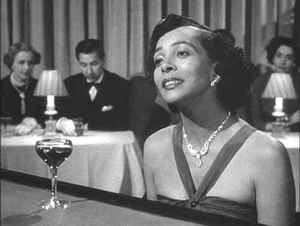
Hadda Brooks
Source:
Lileks
'Rockin' the Boogie' Composed by Hadda Brooks Issued on Modern Music 113 in August 1945
In 1946 Nat King Cole issued a swinging rhythm undeniably flirtatious toward rock to come called 'Route 66'. Written by Bobby Troup toward the arrival of many pennies from heaven, 'Route 66' captured the element in American culture that is the motorway, presaging the interstate highway system begun by President Eisenhower in 1956. If the train was a major theme in country music, the car would be the darling of rock.
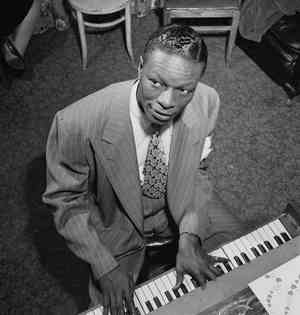
Nat King Cole
Photo: William P. Gottlieb
Source: Circulo de Estudios
'Route 66' Nat King Cole 1946 Composed by Bobby Troup
'Send For Me' Nat King Cole Issued 6 June 1957
Composition by Bobby Troup Conducting by Billy May
'Mr. Cole Won't Rock and Roll' Nat King Cole 9 Oct 1960
Composition: Jimmy, Joe & Noel Sherman
In 1945 Hot Lips Page had issued 'They Raided the Joint' on Continental C-6017. Page had written that with Aristine Jackson and Joe Eldridge. The next year Louis Jordan released 'They Raided the House' with a different arrangement by Dan Burley, which seems to be the one used by Helen Humes when she put down 'They Raided the Joint' on 2 April 1947. Born in 1913, Humes had first recorded at age fourteen with blues guitarist, Sylvester Weaver, in 1927. In 1937 she joined the big band of Harry James. The next year she replaced Billie Holiday in the Count Basie Orchestra. Leaving Basie in 1942, she thereafter led a solo career until her death on 9 Sep 1981.
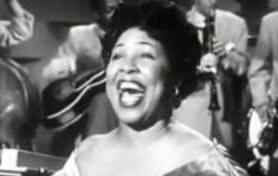
Helen Humes
Source: Data B
'They Raided the Joint' Helen Humes 9 Oct 1947
Ella Mae Morse was born in 1924 in Mansfield, Texas. At age 17 she joined the band of boogie woogie pianist, Freddie Slack, and made her first recording, 'Cow Cow Boogie' (1942). That became Capitol Records' first gold disc. Although Morse made her last name issue in 1957 per the LP, 'Morse Code', she continued working nightclubs on both coasts into the nineties, such as Michael's Pub in New York, and Ye Little Pub, the Cinegrill and the Vine St. Bar and Grill in Los Angeles. She also appeared at Disneyland for several years with the Ray McKinley Orchestra and toured Australia. Morse died in 1999 of heart failure in Bullhead, Arizona.
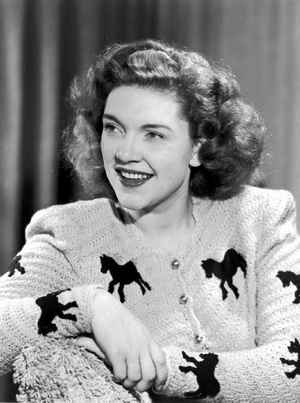
Ella Mae Morse
Source: OK Music
'Get Off It and Go' Ella Mae Morse Issued June 1947 on Capitol 424
Composition: Dick Larken
'Okie Boogie' Ella Mae Morse Issued 1951
Composition: Johnny Tyler Guitar: Jimmy Bryant Pedal steel: Speedy West
'Blacksmith Blues' Ella Mae Morse Composition: Jack Holmes Issued 1952
'Rock Me All Night' Ella Mae Morse Issued 1953
Composition: Bill Sanford-Jimmy Ricks
'Razzle Dazzle' Ella Mae Morse Issued 1955
Composition: Charles Calhoun
'Rock and Roll Wedding' Ella Mae Morse Issued 1956
Composition: Charles Calhoun
Dinah Washington delivered a couple of detours from her bluesy repertoire in 1960 with Brook Benton called 'Baby, You've Got What It Takes' (Mercury 71565X45) and 'A Rockin' Good Way' (Mercury 71629X45). Washington had been born on 29 August 1924 in Tuscaloosa, Alabama. Her first recording in 1944, 'Evil Gal Blues' had been backed by Lionel Hampton. I don't know why her 'Am I Asking Too Much' of 1948 (Mercury 8095) is singled out for inclusion in The Rock and Roll Hall of Fame's '500 Songs That Shaped Rock and Roll'. Washington died at the young age of 39 due to an accidental drug overdose in Detroit on 14 December 1963.
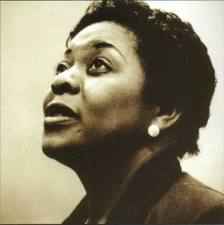
Dinah Washington
Source: ladybret
'Am I Asking Too Much' Dinah Washington Mercury 8095 1948
Composition: Helen Miller-Fay Whitman
'Baby, You've Got What It Takes' Brook Benton w Dinah Washington Mercury 71565X45 1960
Composition: Ben Raleigh-Don Wolf
'A Rockin' Good Way' Brook Benton w Dinah Washington Mercury 71629X45 1960
Composition: Brook Benton-Luchi DeJesus
'Night Train' was saxophonist, Jimmy Forrest's first name issue in March 1952 on United 1034, that backed by 'Bolo Blues' [45Worlds]. Born on 24 Jan of 1920, Forrest had first recorded with the band of saxophonist, Andy Kirk, in latter 1943, having joined that outfit in 1942. Forrest died of heart failure on 26 August 1980.
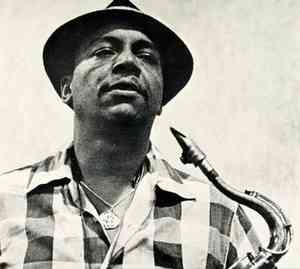
Jimmy Forrest
Source: Papy Blues
'Night Train' Jimmy Forrest Issued March 1952
Composition: Oscar Washington-Lewis Simpkins-Jimmy Forrest
'Cocktails For Two' Jimmy Forrest Issued 1956
Composition:
Arthur Johnston-Sam Coslow Arrangement: Billy Mure
In 1955 Count Basie (piano) and his swing jazz orchestra issued 'Rock-A-Bye Basie' with Buck Clayton at trumpet. Basie had been born on 21 August 1904, Clayton on 12 November 1911. Clayton replaced Hot Lips Page in Basie's organization in latter 1936 to remain until 1943. Page had been with Basie since the year before. Clayton was with Basie during Billie Holiday's brief tenure with that orchestra in latter 1937. Other notable members of Basie's outfit included saxophonist, Buddy Tate, who performed with Basie from 1939 to 1948, and Paul Quinichette who joined for a couple years in 1951. Basie died on 26 April 1984, Clayton on 6 December 1991.
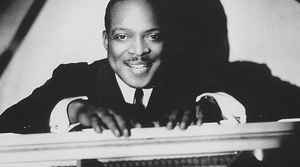
Count Basie
Source: Time Toast
'Rock-A-Bye Basie' Count Basie w Buck Clayton Issued 1955
Composition: Count Basie-Lester Young-Myles Collins
As witnessed above, boogie woogie and swing rippled over a rather low categorical waterfall into the pool of R&B and rock n roll which disc jockey, Alan Freed, delineated in 1954. Billboard had published its first Rhythm and Blues category on 24 October 1942. Freed later began to spin rhythm and blues as "rock and roll" in a bid to attract a white audience.
Sources & References:
bayard (Billboard Rhythm & Blues)
Western Michigan University (500 Songs That Shaped Rock and Roll)
Further Reading:
Classical Main Menu Modern Recording
hmrproject (at) aol (dot) com